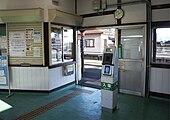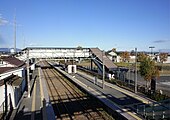Kunisada Station
This article needs additional citations for verification. (January 2021) |
Kunisada Station 国定駅 | |||||||||||
|---|---|---|---|---|---|---|---|---|---|---|---|
 Kunisada Station, December 2007 | |||||||||||
| General information | |||||||||||
| Location | 2 Kunisada-cho, Isesaki-shi, Gunma-ken 379-2221 Japan | ||||||||||
| Coordinates | 36°21′32″N 139°14′33″E / 36.3589°N 139.2426°E | ||||||||||
| Operated by | |||||||||||
| Line(s) | ■ Ryōmō Line | ||||||||||
| Distance | 63.3 km from Oyama | ||||||||||
| Platforms | 1 side + 1 island platform | ||||||||||
| Other information | |||||||||||
| Status | Staffed | ||||||||||
| Website | Official website | ||||||||||
| History | |||||||||||
| Opened | 20 November 1889 | ||||||||||
| Passengers | |||||||||||
| FY2021 | 1,285 daily | ||||||||||
| Services | |||||||||||
| |||||||||||
| |||||||||||
Kunisada Station (国定駅, Kunisada-eki) is a passenger railway station in the city of Isesaki, Gunma Prefecture, Japan, operated by East Japan Railway Company (JR East).[1]
Lines
[edit]Kunisada Station is served by the Ryōmō Line, and is located 63.3 km from the terminus of the line at Oyama Station, and 28.4 km from Takasaki Station. The preceding station of Iwajuku is 6.4 km away and the following station of Isesaki is 5.8 km away.
Station layout
[edit]The station consists of one side platform and one island platform connected by a footbridge. The station is staffed.[2]Kunisada Station has no accessibility features.[3]
Platforms
[edit]Source:[4]
| 1 | ■ Ryōmō Line | for Kiryū and Oyama |
| 2, 3 | ■ Ryōmō Line | for Isesaki, Maebashi, and Takasaki |
- Ticket GateNovember 2021
- Platforms November 2021
History
[edit]Kunisada Station was opened on 20 November 1889. The station was absorbed into the JR East network upon the privatization of the Japanese National Railways (JNR) on 1 April 1987. The station started accepting Suica cards on November 18, 2001.
Passenger statistics
[edit]In fiscal 2021, the station was used by an average of 1,285 passengers daily (boarding passengers only).[5]
Below is table containing the passenger statistics since the year 2000:
| Passenger statistics | |||||
|---|---|---|---|---|---|
| Year | Average Daily Boarding Passengers | Year | Average Daily Boarding Passengers | Year | Average Daily Boarding Passengers |
| 2000 | 1,211[6] | 2010 | 1,296[7] | 2020 | 1,161[8] |
| 2001 | 1,185[9] | 2011 | 1,317[10] | 2021 | 1,285[5] |
| 2002 | 1,153[11] | 2012 | 1,405[12] | ||
| 2003 | 1,204[13] | 2013 | 1,438[14] | ||
| 2004 | 1,212[15] | 2014 | 1,469[16] | ||
| 2005 | 1,208[17] | 2015 | 1,564[18] | ||
| 2006 | 1,219[19] | 2016 | 1,564[20] | ||
| 2007 | 1,271[21] | 2017 | 1,583[22] | ||
| 2008 | 1,305[23] | 2018 | 1,594[24] | ||
| 2009 | 1,311[25] | 2019 | 1,564[26] | ||
Surrounding area
[edit]- Grave of Kunisada Chūji
- Kunisada Post Office
- Former Azuma village hall
- Gunma Prefectural Psychiatric Medical Center
- Kokutei Park
See also
[edit]References
[edit]- ^ Teishajō hensen daijiten. Kokutetsu JR hen. Nihon Kōtsū Kōsha, 日本交通公社. (Shohan ed.). Tōkyō: JTB. 1998. p. 461. ISBN 4-533-02980-9. OCLC 41362424.
{{cite book}}: CS1 maint: others (link) - ^ "国定駅の情報、写真、印象記(群馬県:JR東日本-両毛線)". travelstation.tokyo (in Japanese). Retrieved 29 March 2023.
- ^ "駅の情報(国定駅):JR東日本". JR東日本:東日本旅客鉄道株式会社 (in Japanese). Retrieved 29 March 2023.
- ^ "JR東日本:駅構内図(国定駅)". JR東日本:東日本旅客鉄道株式会社 (in Japanese). Retrieved 29 March 2023.
- ^ a b "各駅の乗車人員 2021年度 ベスト100以下(5)|企業サイト:JR東日本". JR東日本:東日本旅客鉄道株式会社 (in Japanese). Retrieved 29 March 2023.
- ^ "JR東日本:各駅の乗車人員(2000年度)". www.jreast.co.jp. Retrieved 29 March 2023.
- ^ "JR東日本:各駅の乗車人員(2010年度)". www.jreast.co.jp. Retrieved 29 March 2023.
- ^ "各駅の乗車人員 2020年度 ベスト100以下(5)|企業サイト:JR東日本". JR東日本:東日本旅客鉄道株式会社 (in Japanese). Retrieved 29 March 2023.
- ^ "JR東日本:各駅の乗車人員(2001年度)". www.jreast.co.jp. Retrieved 29 March 2023.
- ^ "JR東日本:各駅の乗車人員(2011年度)". www.jreast.co.jp. Retrieved 29 March 2023.
- ^ "JR東日本:各駅の乗車人員(2002年度)". www.jreast.co.jp. Retrieved 29 March 2023.
- ^ "JR東日本:各駅の乗車人員(2012年度)". www.jreast.co.jp. Retrieved 29 March 2023.
- ^ "JR東日本:各駅の乗車人員(2003年度)". www.jreast.co.jp. Retrieved 29 March 2023.
- ^ "各駅の乗車人員 2013年度 ベスト100以外(5):JR東日本". www.jreast.co.jp. Retrieved 29 March 2023.
- ^ "JR東日本:各駅の乗車人員(2004年度)". www.jreast.co.jp. Retrieved 29 March 2023.
- ^ "各駅の乗車人員 2014年度 ベスト100以外(5):JR東日本". www.jreast.co.jp. Retrieved 29 March 2023.
- ^ "JR東日本:各駅の乗車人員(2005年度)". www.jreast.co.jp. Retrieved 29 March 2023.
- ^ "各駅の乗車人員 2015年度 ベスト100以外(5):JR東日本". www.jreast.co.jp. Retrieved 29 March 2023.
- ^ "JR東日本:各駅の乗車人員(2006年度)". www.jreast.co.jp. Retrieved 29 March 2023.
- ^ "各駅の乗車人員 2016年度 ベスト100以外(5):JR東日本". www.jreast.co.jp. Retrieved 29 March 2023.
- ^ "JR東日本:各駅の乗車人員(2007年度)". www.jreast.co.jp. Retrieved 29 March 2023.
- ^ "各駅の乗車人員 2017年度 ベスト100以外(5):JR東日本". www.jreast.co.jp. Retrieved 29 March 2023.
- ^ "JR東日本:各駅の乗車人員(2008年度)". www.jreast.co.jp. Retrieved 29 March 2023.
- ^ "各駅の乗車人員 2018年度 ベスト100以外(5):JR東日本". www.jreast.co.jp. Retrieved 29 March 2023.
- ^ "JR東日本:各駅の乗車人員(2009年度)". www.jreast.co.jp. Retrieved 29 March 2023.
- ^ "各駅の乗車人員 2019年度 ベスト100以外(5):JR東日本". www.jreast.co.jp. Retrieved 29 March 2023.
External links
[edit]- JR East Station information (in Japanese)


 French
French Deutsch
Deutsch


